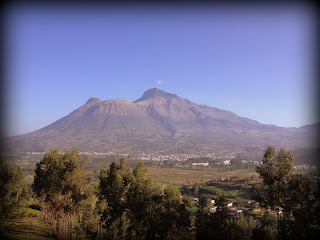Listening: Part I
"Sleep, sleep, I croon . . . Sleep I sing—I who am unmelodious and hear no music save rustic music when a dog barks, a bell tinkles, or wheels crunch upon the gravel. I sing my song by the fire like an old shell murmuring on the beach." – Virginia Woolf, The Waves
At three o'clock in the morning, not wanting to be awake, a pleasure takes over. I'm listening. Pebbles of rain pelt the windows. Redwoods slap and whistle in the wind. Countless frogs around the pond out front creak and ribbit, literally singing in the rain. Still dreamy, I notice a voice, "Hearing is the last sense to give in." It is one of my mother's oncologists, and I believe him.
When my mother lay in her final unconscious hours of life, the rest of us talked in calm, reverent whispers to her, until we realized that death was hanging out in another room, running late. Our voices, almost unconsciously, rambled into normal family conversation, and before long, we found ourselves laughing. My niece, 8 years old and puzzled by the change in her grandma's fleecy, post-chemo hair, asked an absurd but honest question.
My mother always insisted that she wouldn't die until everyone was laughing. Though her head lolled to one side, toward my father, a single, slow tear etching her cheek, in our laughter she got what she wanted, or needed, and let go. What had she heard in those surreal hours?
Redwood cones and twigs thud on the deck outside. Inside the cats, startled, are loping through the house. I hear their worried feet softly drumming on the hardwood floors, the male cat moaning low, the little female squeaking out a 'mew.' My husband beside me is lost in sleep, his breath, a slow hum. Does he somehow hear any of this? Will he wake surprised to have been dreaming of water, frogs, and running?
I get up and crack a window to let in more sound. Every frog quiets. In the absence of their organic music, I realize the full volume of their voices. Back in bed, I begin to think of daytime things. The frogs crank up, pulling me back into the moment, their exuberance loud and joined by the rain's steady rhythm. Closing my eyes, I hear even more, the pounding ocean, five miles away, thinking "A great beast's foot is chained. It stamps, and stamps, and stamps,"—a favorite line from Virginia Woolf's The Waves.
I'm currently reading a new collection of Pablo Neruda's sea poems called, "On the Blue Shore of Silence." In an afterword, a fellow Chilean writer explains how Chile's geography, being a long strip of land caught between the Andes and the sea, might make Chileans feel trapped, prompting an urge to travel. Perhaps they hear that chained beast, too. As my mind tries to still itself back into sleep, I think in parallels. Living here on California's North Coast, between the Trinity Alps and the northern edge of Neruda's beloved "blue shore," I don't feel trapped, but rather, nestled, though admittedly also restlessness. "You think too much," my mother would say, glancing up from her needlework.
Giraffe, lions, small delicate antelope, and a curious band of meerkats parade my thoughts as I try to use a planned trip to Botswana and Zambia to lure me into dreaming. I've read that it is so silent in the Kalahari Desert and the depths of the Okavango Delta, that you can hear a lion roar five miles away. The great beast of my ocean stamping, begins to sound like that lion. Neruda wasn't quite right. There is no silence, only a failure to listen fully.
 The wind is a subtle hush in the forest canopy now. My two local lions curl into the comforter at my feet. Eventually I slip into that sweet, sought oblivion—my ear like a shell pressed to the pillow, sound of the sea inside.
The wind is a subtle hush in the forest canopy now. My two local lions curl into the comforter at my feet. Eventually I slip into that sweet, sought oblivion—my ear like a shell pressed to the pillow, sound of the sea inside.


I LOVE your writing and eagerly anticipate the next addition. No pressure though!!!
ReplyDeleteMadalyn, thank you. A little pressure = a little discipline, so not a bad thing:)
ReplyDelete